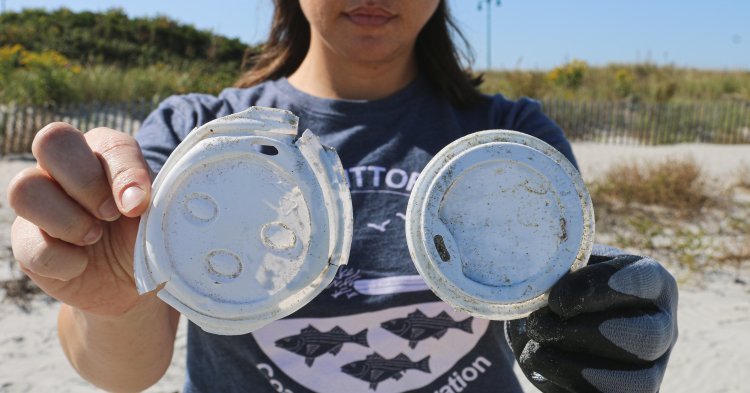In the summer time, the sun rises early over the Mediterranean. The beach is still almost devoid of people. The city cleaning staff has already started with the laborious cleaning. They free the fine-grained sand from bags, bottles, cans, lighters, clothes and packaging waste. It is not only the beach that is getting littered every day, but the water quality of the Mediterranean Sea is also in an alarming state.
Different types of pollutants endanger people and nature
The Mediterranean coast is densely populated. Many coastal towns do not have sewage treatment plants and instead discharge their wastewater directly into the Mediterranean Sea. On top of this comes the pollution caused by oil tankers that carry out illegal tank rinsing on the open sea. Industry and agriculture also pollute the Mediterranean with waste and hazardous substances, which reach the sea through rivers. In 2018, one of the most devastating environmental scandals in the Mediterranean occurred in the city of Gabès in south-east Tunisia. German radio station Deutschlandfunk reported that a chemical factory there discharged radioactive and carcinogenic waste, which was produced during phosphate production, directly into the sea.
The threat posed by pollutants is proving to be exceptionally high for the Mediterranean Sea because it is above average in terms of salinity and temperature. It, therefore, contains little oxygen, which plays a major role in the decomposition of contaminants. The Mediterranean also has no significant ocean currents, which means that oxygen cannot reach deeper layers. Even through the narrow Strait of Gibraltar, only small amounts of fresh Atlantic water circulate. As a result, large quantities of pollutants and waste accumulate in the Mediterranean over long periods of time. Plastic waste is thereby the most serious problem.
According to the WWF, 22 kilograms of plastic waste was found in the stomach of a Sperm Whale washed up on the Italian coast in April 2019. However, small marine animals are also affected as the plastics decompose into tiny particles in the water. Although the plastic waste shreds over the years, it is not biodegradable and can never completely dissolve. The so-called microplastics are not only taken up by fish and turtles, but also enter the human food chain through these animals. The effects of microplastics on human health cannot yet be determined. But mankind is certainly harming itself through this plastic waste.
The coastal inhabitants are not to blame
Particularly in the summer months, large numbers of tourists populate the Mediterranean coast - frequently as many as there are coastal residents. The wastewater from hotels, oil pollution from motorboats and the residues of sun cream pollute the Mediterranean Sea. But the most urgent problem is the plastic waste that tourists leave behind. During the summer, the amount of plastic waste in holiday resorts increases by up to 40 per cent. According to MDR (German radio station), researchers claim to have found around 300 pieces of waste per square kilometre on the Corsican coast and in the Gulf of Lyon. Once the waste has reached the Mediterranean Sea, it will be washed up on the coasts within a few years, spoiling the paradise-like holiday scenery.
According to German newspaper FAZ, the plastic waste comes mainly from Spain, Turkey, France, Italy and Egypt. But anyone who may think that Germany is too far away from the Mediterranean to be part of the problem would be mistaken. Every single German produces about 220kg of packaging waste a year. Germany exports part of its plastic waste to Turkey, among other countries. In 2018, according to the WWF, this amounted to over 50,000 tons of plastic waste. The main problem is open landfills, from which the wind carries the garbage uncontrolled via streams into the sea.
Far-reaching measures are needed
In the future, Germany’s role in fighting pollution could be to revise its own waste management and establish a more sustainable local plastic cycle based on local recycling. Initial measures have also been decided at EU level: Around eight billion of the approximately 100 billion plastic bags consumed annually in the EU will end up in the world’s oceans, according to the European Parliament in 2015. In May 2019, the EU states decided that disposable plastic, for which sustainable alternatives are available, should disappear from the market from 2021. This will affect straws, cotton swabs and plastic dishes, among other things. Plastics are not only found in these products, but also in polyester clothing, cosmetic products and hygiene articles. Therefore, only a broad consciousness and change of attitude of the EU citizens can make a difference. This includes taking litter as well as flip-flops, frisbees or whole beach shells home after a visit to the beach, as well as collecting small plastic objects like bottle caps, cigarette butts and candy wrappers.
Ultimately, whether the Mediterranean can be saved will depend on the EU, on the Member States, and on each of us. In addition to the establishment of marine protected areas, the construction of wastewater treatment plants in coastal regions may also have a positive impact on water quality. Extended monitoring, control and sanctioning of oil tankers by the coast guard could also contribute to saving the Mediterranean Sea. Most important, however, is a sustainable plastic cycle in all EU member states and a reduction in the consumption of plastic. Perhaps one day the Mediterranean will show itself in its natural beauty, as the canals of Venice already do at the present moment.


Follow the comments: |
|
